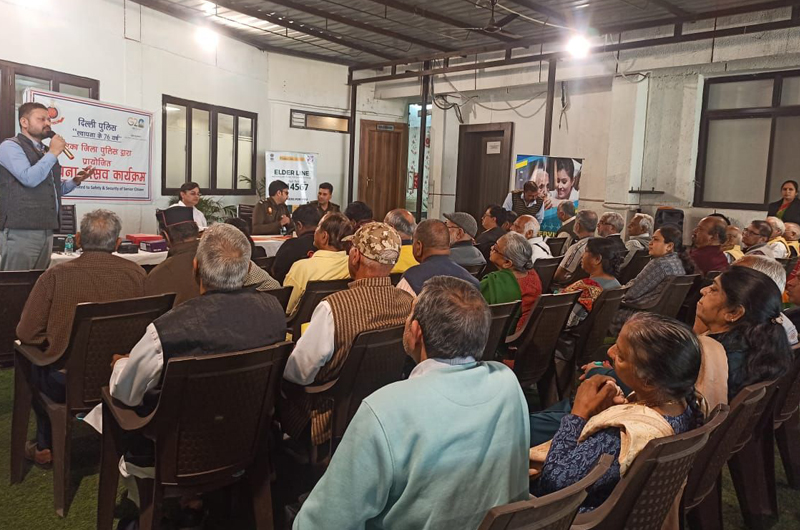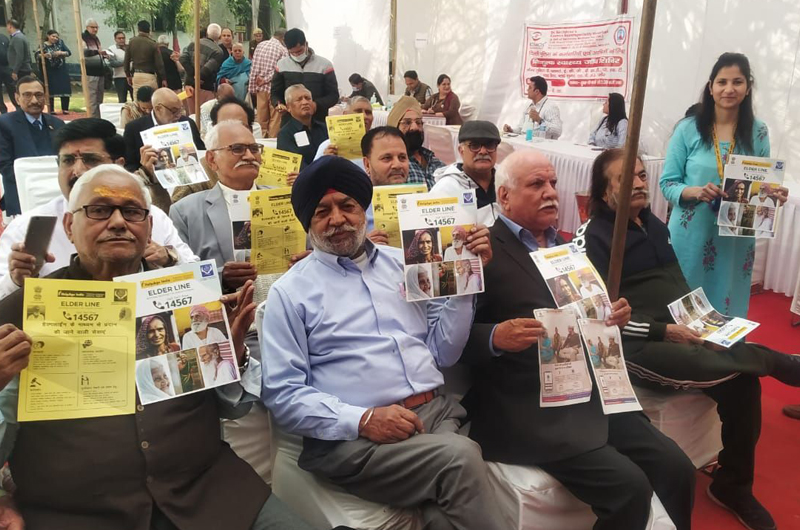With the disintegration of joint families and loved ones not spending enough time with aged people, more and more old folk are feeling lonely and facing anxiety issues. Some even face harassment and abuse. Help is only a phone call away, thanks to Elder Line. Sarita Brara has the details
Ravi* was a chain smoker, but when the COVID-19 lockdown happened and his family was at home 24×7, he found he could not indulge in the habit any more. So he shifted focus to nurturing a jasmine plant in his garden, concentrating all his energies on that. Yet, one day, the plant died. That took a huge emotional toll on the 76-year-old man from a village in Telangana, who saw it as a sign that he and his family would perish.
Elder Line was informed about the man’s plight, and a team contacted him. The senior citizen’s conversation with the team was all about snakes and insects and someone out to harm him. Elder Line began counselling him. Sessions were held as frequently as every alternate day. The patient was aware that there was something wrong with him, and willingly followed the advice he was given. In due course, Ravi’s son informed Elder Line that his dad was almost back to normal, functional, and able to handle his own needs.
Elsewhere, an elderly man was stranded alone in his house, and in dire need of medications which he could not get due to the lockdown. His nephew contacted Elder Line, and the call officer shared the details with the field response officer after verifying the prescription. The medicines were home delivered. Hundreds of such cases were recorded during the Lockdown.
Elder Line, which was started during the second wave of the pandemic, received a large number of calls, requesting doorstep delivery of medicines and rations, arranging for caregivers, and also for emotional support. The service responded to around 14000 calls in Delhi itself between May 25, 2020 and January-end, 2021.
Shivendra Kumar, programme manager, Elder Line, Delhi, says many elderly persons made repeated calls during the pandemic and a bonding of sorts developed between them and the Elder Line staff. For instance, there was one man who often called them to share his poems and bhajans (devotional songs).

Even after the pandemic waned, an average 1.25 lakh people still make use of the exclusive helpline for senior citizens every month, an indication of the magnitude of problems this section of society faces, says Dr. H.C. Sridhara Channakeshava Ranga Reddy, deputy director, National Institute of Social Defence (NISD).
Elder Line was launched in May 2021 by the Social Justice and Empowerment Ministry in collaboration with NISD and participating state governments and Union territories. Its toll free-number – 14567 – operates on all 7 days of the week from 8 am to 8 pm, catering to all sorts of inquiries from the elderly, providing them guidance and even arranging intervention through field officers in cases of abuse or harassment, or to provide emotional support.
With the disintegration of joint families and loved ones not spending enough time with the elderly, more and more old folk are feeling lonely and facing anxiety issues. A simple conversation on phone can provide the elderly with the emotional support that they need, says Dr Reddy. These calls can help them de-stress, relieve their anxiety and cope with loneliness, besides helping them to manage relationship and other issues.
Those handling the helpline say sometimes conversations go on for 45 minutes or more. Members of the Elder Line team even meet the elderly and support them with the help of state departments. Most often, the helpline is used to report harassment or abuse of the elderly, or to reunite them with their families.
Recently, a 76-year-old homeless woman who used to beg for a living suffered an injury to her foot. A passer-by saw her lying in a bus shelter and called Elder Line. The field officer assigned to the case arranged for the woman to be provided shelter in an anganwadi (nursery or day-care centre), but other inmates complained that she did not bathe or change her clothes.
The team faced a severe challenge in arranging for the woman’s care, not only because she was herself reluctant to go into an institution but also because old age homes refused to accommodate her for reasons of personal hygiene. She was given temporary shelter in many institutions, but the staff had to be paid extra to clean her up. Eventually, one home agreed to accommodate her, provided the Elder Line team visited every week to check on her status.
In many cases the elderly face abuse and harassment at the hands of their own children or relatives. The personnel handling the helpline guide them with regard to the legal avenues available to them. Property issues are one of the main reasons for the harassment.
In one case, a caller informed Elder Line that an aged couple in a village was being mentally and physically abused by their two nephews, who had even hired goons to force them to vacate their house. Later, a villager convinced the couple to sell the house and shift to a smaller home, promising that a sum of Rs 11 lakh would be paid into their account. But the full amount was not given. The Elder Line team took the help of the local police station and the matter was resolved. The elderly couple now lives peacefully.
In another case, a 75-year-old man had issues with the association of his apartment building in Hyderabad for three years. An Elder Line officer counselled him and gave him moral support and the legal advisor guided him on his next course of action. The matter was soon settled.
Interestingly, the number of elderly men contacting Elder Line far exceeds that of women. In addition to the helpline, NISD holds workshops for residents welfare associations, webinars and off-line programmes from time to time on issues such as maintenance, dementia and health issues that senior citizens face. It also offers an online course on dementia.
*Name changed to protect the person’s identity.
(The writer is a senior journalist who spends time in Delhi and Shimla.)



 from Webdoux
from Webdoux